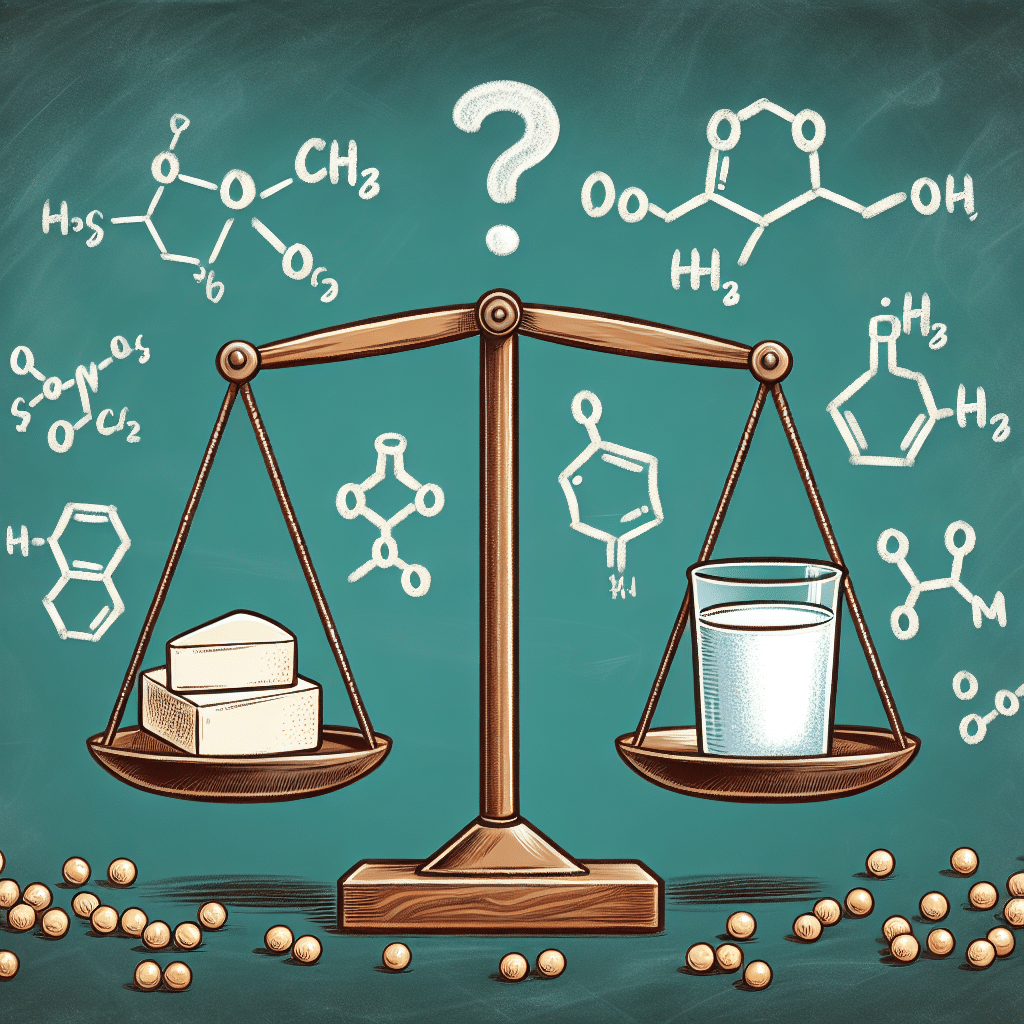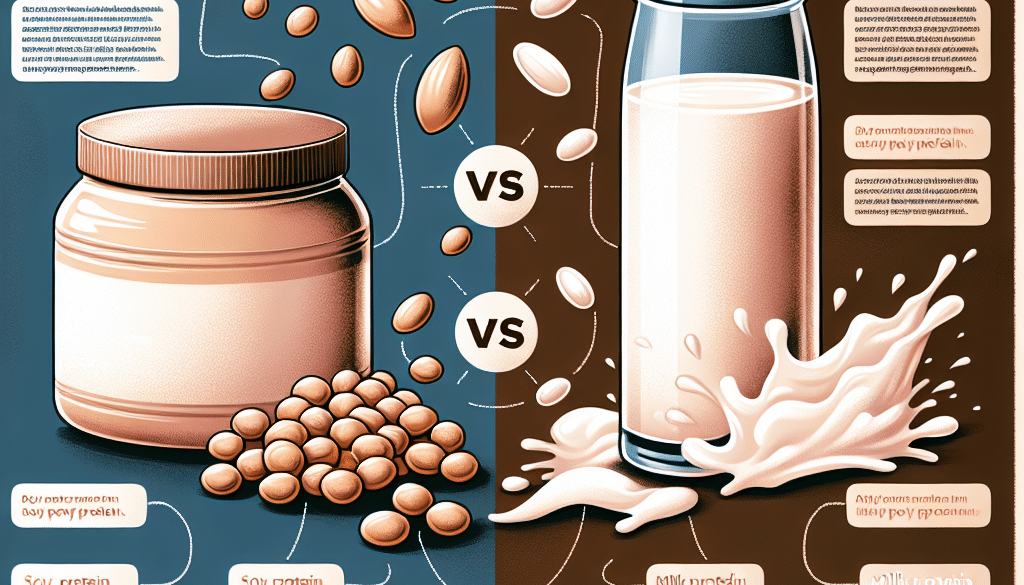Is Soy Protein Better Than Milk Protein?
-
Table of Contents
- Soy Protein vs. Milk Protein: Which is the Superior Choice?
- Understanding Protein Quality
- Nutritional Profiles of Soy and Milk Proteins
- Health Implications
- Soy Protein and Health
- Milk Protein and Health
- Environmental Impact
- Case Studies and Statistics
- Conclusion: Weighing Your Options
- Discover ETprotein’s High-Quality Protein Products
Soy Protein vs. Milk Protein: Which is the Superior Choice?

When it comes to protein supplements, the debate between soy and milk protein is a longstanding one. With the rise of plant-based diets and the increasing awareness of dietary restrictions and allergies, consumers are more curious than ever about the benefits and drawbacks of these protein sources. This article delves into the nutritional profiles, health implications, and environmental impacts of soy and milk proteins to determine which might be the better choice for your dietary needs.
Understanding Protein Quality
Before comparing soy and milk protein, it’s essential to understand what makes a protein source “high quality.” Protein quality is determined by its amino acid profile and digestibility. A complete protein contains all nine essential amino acids in sufficient amounts. Both soy and milk proteins are considered complete proteins, but they differ in their amino acid composition and the rate at which the body can absorb them.
Nutritional Profiles of Soy and Milk Proteins
Soy protein is derived from soybeans and is a popular choice for vegetarians and vegans. It’s low in saturated fat and cholesterol-free. Milk protein, which includes whey and casein, is derived from dairy and is known for its high content of essential amino acids, particularly leucine, which is crucial for muscle synthesis.
- Soy Protein: Rich in isoflavones, which have antioxidant properties and may provide health benefits.
- Milk Protein: Contains lactose, which can be problematic for lactose-intolerant individuals, and is higher in essential amino acids.
Health Implications
Both soy and milk proteins have unique health implications that may influence an individual’s choice.
Soy Protein and Health
Soy protein has been studied for its potential role in reducing the risk of heart disease. The FDA has recognized that 25 grams of soy protein a day, as part of a diet low in saturated fat and cholesterol, may reduce the risk of heart disease. Soy isoflavones have also been researched for their potential to alleviate menopausal symptoms and reduce the risk of certain cancers, though more research is needed.
Milk Protein and Health
Milk protein, particularly whey protein, is highly regarded in the fitness community for its role in muscle repair and growth. It’s also been associated with immune system benefits due to its high content of immunoglobulins and lactoferrin. However, milk protein can be allergenic and is not suitable for those with a milk allergy or lactose intolerance.
Environmental Impact
The production of soy and milk proteins has different environmental footprints, which is an important consideration for many consumers.
- Soy Protein: Generally has a lower environmental impact than animal-derived proteins. Soy cultivation requires less water and land and produces fewer greenhouse gas emissions.
- Milk Protein: Dairy farming is resource-intensive, requiring more water and land. It also contributes to higher greenhouse gas emissions.
Case Studies and Statistics
Several studies have compared the effects of soy and milk proteins on muscle synthesis, weight management, and overall health. For instance, a study published in the “Journal of Nutrition” found that soy protein was just as effective as whey protein in promoting muscle growth when consumed after resistance exercise. However, other research suggests that the higher leucine content in whey protein may lead to more efficient muscle protein synthesis.
From an environmental perspective, the “Journal of Cleaner Production” published a study indicating that soy protein production has a significantly lower carbon footprint compared to dairy protein production, making it a more sustainable choice.
Conclusion: Weighing Your Options
Both soy and milk proteins have their advantages and disadvantages. Soy protein is a plant-based, environmentally friendly option with potential health benefits beyond muscle synthesis. Milk protein, particularly whey, is favored for its superior amino acid profile and muscle repair properties but comes with environmental and dietary concerns.
Ultimately, the choice between soy and milk protein should be based on individual dietary needs, health goals, and environmental values. It’s also important to consider the quality of the protein source and opt for non-GMO and organic options when possible.
Discover ETprotein’s High-Quality Protein Products
If you’re looking for premium protein options, consider ETprotein’s range of products. They offer a variety of organic, non-GMO, allergen-free vegan proteins that cater to diverse dietary preferences and needs. Whether you’re interested in soy protein or exploring other plant-based alternatives, ETprotein has you covered with their high-purity, neutral-tasting protein powders.
About ETprotein:
ETprotein, a reputable protein and L-(+)-Ergothioneine (EGT) Chinese factory manufacturer and supplier, is renowned for producing, stocking, exporting, and delivering the highest quality organic bulk vegan proteins and L-(+)-Ergothioneine. They include Organic rice protein, clear rice protein, pea protein, clear pea protein, watermelon seed protein, pumpkin seed protein, sunflower seed protein, mung bean protein, peanut protein, and L-(+)-Ergothioneine EGT Pharmaceutical grade, L-(+)-Ergothioneine EGT food grade, L-(+)-Ergothioneine EGT cosmetic grade, L-(+)-Ergothioneine EGT reference grade and L-(+)-Ergothioneine EGT standard. Their offerings, characterized by a neutral taste, non-GMO, allergen-free attributes, with L-(+)-Ergothioneine purity over 98%, 99%, cater to a diverse range of industries. They serve nutraceutical, pharmaceutical, cosmeceutical, veterinary, as well as food and beverage finished product distributors, traders, and manufacturers across Europe, USA, Canada, Australia, Thailand, Japan, Korea, Brazil, and Chile, among others.
ETprotein specialization includes exporting and delivering tailor-made protein powder and finished nutritional supplements. Their extensive product range covers sectors like Food and Beverage, Sports Nutrition, Weight Management, Dietary Supplements, Health and Wellness Products, and Infant Formula, ensuring comprehensive solutions to meet all your protein needs.
As a trusted company by leading global food and beverage brands and Fortune 500 companies, ETprotein reinforces China’s reputation in the global arena. For more information or to sample their products, please contact them and email sales(at)ETprotein.com today.














